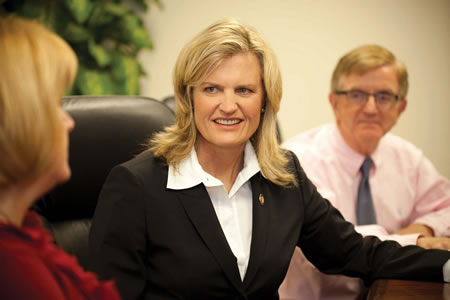Getting to Know Leslie Daigle

OK, I admit it. I find the drama of the campaign among Leslie Daigle, Allan Mansoor, and Bob Rush to represent California’s 74th Assembly District compelling.
This is a newly redrawn district, covering Costa Mesa, Newport Beach, Laguna Beach, and Laguna Woods, and parts of Huntington Beach and Irvine. It’s now more balanced politically, with a higher percentage of Democrats and Independents. There is no true incumbent (Allan Mansoor has represented just 20 percent of the new 74th). For the first time, the June 5 primary is an open one so voters can cross party lines, and the top two vote getters will contend in the November general election.
To me, the two Republicans, Daigle and Mansoor, and Rush, the Democrat, seem quite different in style and substance. Does all this mean that a new era is dawning for the voters, particularly the moderates, of the 74th?
Wanting to get to know them better, I invited the candidates to hour-long interviews, which will run here over the next few weeks. I asked about three issues: the environment, education, and public pension reform. And since all three candidates claim to be fiscally conservative, I asked each for a definition.
Leslie Daigle was waiting at the Zinc Café in Corona del Mar. She lives nearby, in a town home in The Bluffs in Newport Beach and likes to bicycle the Back Bay. She holds a bachelor’s degree in geography from the University of Denver, graduated from the Denmark International Study Program at the University of Copenhagen, and completed a leadership program at Harvard University’s Kennedy School of Government. Daigle got into politics because, after years of working as a government relations consultant for companies, she wanted to represent people.
“There’s a sense that government can bring a better outcome for people, and I wanted to provide the leadership for that,” she says.
In 2002 she joined the Newport Beach Planning Commission; since 2006 she has served on the Newport Beach City Council.
About the Environment: “The new 74th is very much a coastal district. Surf City (Huntington Beach) attracts lots of major surfing events. Laguna Beach is really iconic in drawing people to its beaches. Newport has its boaters, that great nautical heritage. I was the [city] council’s lead advocate to secure the resources necessary to complete the Upper Newport Bay Ecological Restoration Project and initiate the dredging of the harbor. These projects were languishing for years from a lack of political leadership and multi-agency gridlock. The dredging is a template that demonstrates my…ability to work with state and federal government and numerous diverse groups — asking [the] hard questions that drive activity.”
Daigle sees close ties between clean water and beaches clean and the district’s economic health.
“Tourism and the hotels, from Hilton’s Waterfront Beach Resort to the Balboa Bay Club and Pelican Hills Resort to the Montage — all contribute to the 74th’s economy.”
On Education: “The community of Irvine is really education focused, but government isn’t going to be able to do everything. One of the best examples I’ve ever seen of public-private partnership is the Irvine Public Schools Foundation, between the city, school district, and private entities. We need more partnerships like this one – they tend to raise public awareness of the issues our schools face and help make government more accountable. I sat down with Paul Reed, the chief business officer of Newport-Mesa Unified School District, and went over school financing. One of the endorsements I’m proudest of is his. …
“While the state has a certain overall format, on-going dialogue with each school district, including their chief business officer, is critical to maximizing my responsiveness and flexibility to serve the uniqueness of each school district within the 74th.”
On Public Pension Reform: “The Newport Beach City Council has always engaged in collective bargaining with their employees. During my time on the council, we made the better decision to get our employees to pay — for the first time — costs toward their pensions. It wasn’t easy – it resulted from hard work, persistence, and negotiation.”
Daigle supports the governor’s 12-point plan, though she remains concerned about the sustainability of the system. CalPERS (the California Public Employees’ Retirement System), she said, has not always been a good partner in assisting cities to make good long-range decisions.
“They do not inform cities in a precise manner. Most people don’t understand that if CalPERS takes major risks with our retirement funds and loses, it comes back to local government for higher contributions. … Taxpayers pay for its risky behavior. I plan to bring leadership at the state level to end the unlimited bankrolling of CalPERS’s gambling instincts.”
Daigle concludes: “A fiscal conservative is someone who does what can be reasonably done with the tool of government but does not do financial injury to its constituents.”




